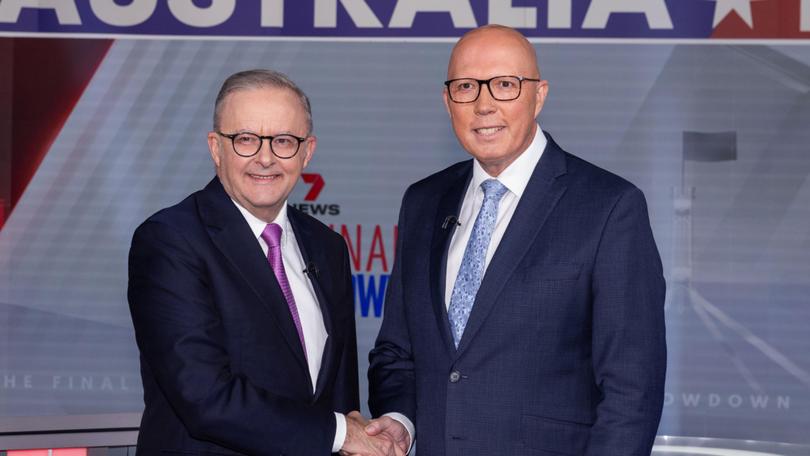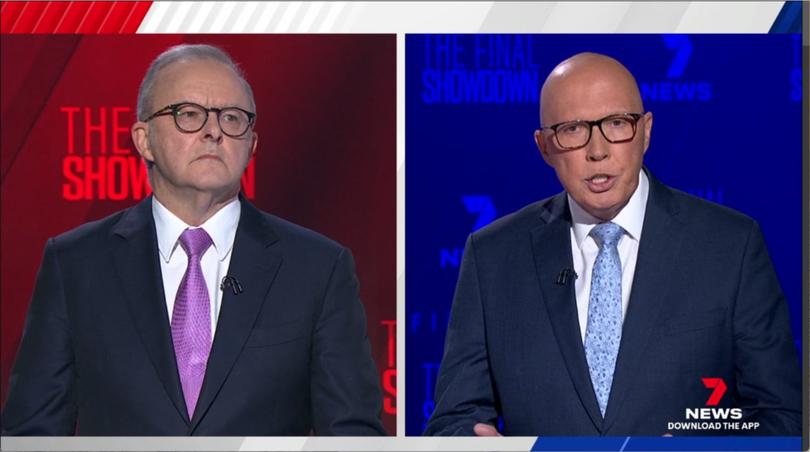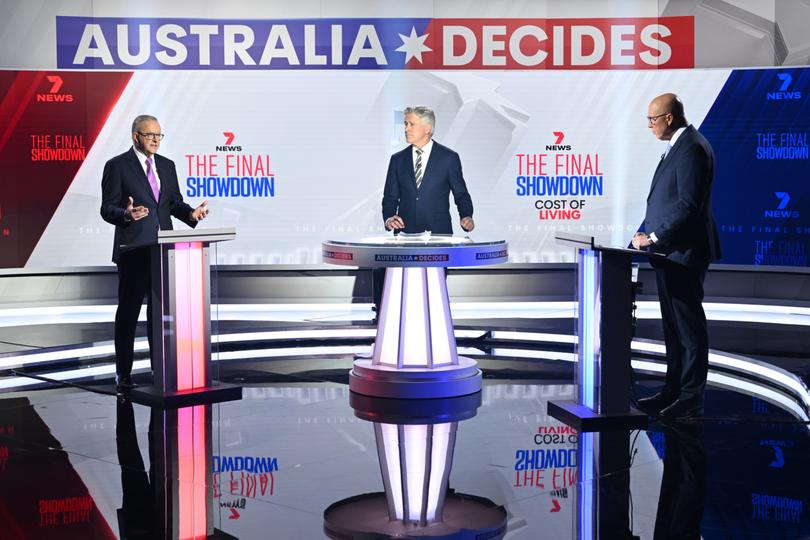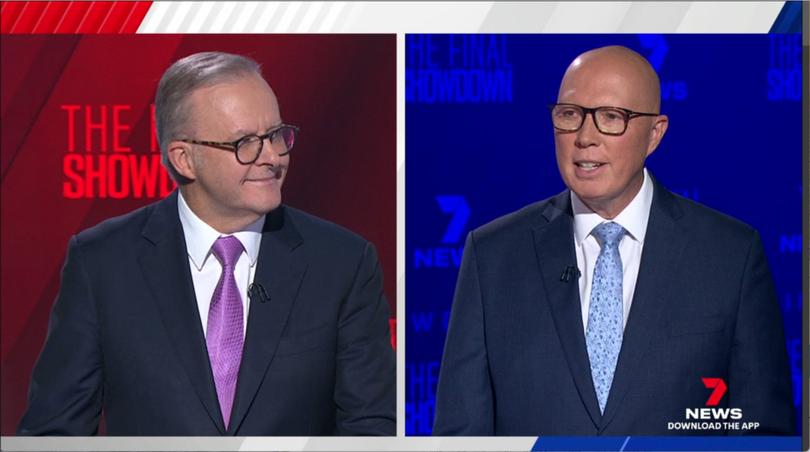Federal election 2025: Peter Dutton unsettles Anthony Albanese in fiery final debate before polling day
The Voice, the price of eggs and an apparently off-grid Trump sparked a heated final debate between Anthony Albanese and Peter Dutton.

A desperate Peter Dutton managed to unsettle Anthony Albanese in the final face-to-face debate by zeroing in on the failed Voice referendum, but failed to deliver a hit on the Prime Minister to change the momentum for the election’s last days.
The two leaders clashed directly over grocery prices, economic management, housing and the relationship with Donald Trump.
With less than a week now until polling day, the toll of a gruelling campaign was starting to show for both leaders – in the shadows under their eyes and their brittleness with each other.
Sign up to The Nightly's newsletters.
Get the first look at the digital newspaper, curated daily stories and breaking headlines delivered to your inbox.
By continuing you agree to our Terms and Privacy Policy.They were far more combative than when they first faced off three weeks ago.
An audience of undecided voters in the 7News studio in Sydney awarded the debate overall to Mr Albanese, with 50 per cent declaring him the winner. Another 25 per cent said Mr Dutton had won them over and the final 25 per cent were still undecided.
They also said Mr Albanese was overwhelmingly the winner on cost of living issues (65 per cent) and tax cuts (59 per cent) and just ahead of his opponent on housing (35 per cent to 30 per cent for Mr Dutton), but preferred the Opposition Leader’s position on Indigenous affairs.
Economic management
Mr Albanese tackled Mr Dutton’s claims about Labor’s policies more directly than he has in the previous debates.
He bristled particularly over the claim people just knew the Liberals were better economic managers, which Mr Dutton has said repeatedly throughout the election.
“Honestly this whole campaign. It’s hard to believe anything you say,” Mr Dutton told the Prime Minister during the debate, adding that he “should be ashamed”.
“You have created an economic mess in our country.
“And our job as a Liberal government, as was the case for John Howard, is to clean up a Labor mess, and that’s what we will do through the interim measures.”

He said what Labor was offering amounted to “a band aid on a bullet wound” after “significant” damage over the past three years.
The spat was prompted by those interim measures from the Coalition – a 12-month halving of fuel excise and a one-off $1200 tax rebate – with Mr Albanese contrasting them with his plans for permanent changes to the tax system.
“Peter can attack me … I won’t get let him get away with this nonsense about economic management,” Mr Albanese said.
“We have worked hard, the Australian people have worked hard in order to get that (inflation) under control. And they deserve better than this pretence that everything was hunky dory in 2022.”
Mr Dutton said groceries had gone up by 30 per cent over the past three years.
Challenged by host Mark Riley, Mr Dutton wouldn’t say where this figure was from.
Labor has claimed it is based on private research by SEC Newgate, rather than the Australian Bureau of Statistics which says they’ve only gone up by about 12 per cent.
“You can’t stand here telling people they’re much better off after three years,” Mr Dutton said.
“If you had a good story to tell, Prime Minister, you would be standing here talking about your so-called achievements.”
Mr Albanese hit back: “The difference between us in this election campaign is that you have identified a range of issues, but you have no solutions, and you pretend that they’ve arisen in May 2022.”
The Australian dream?
Housing has been a key flashpoint during this campaign, with each party offering markedly different plans to get more Australians into the property market.
Asked what they thought the great Australian dream looked like these days, Mr Dutton was quick to say it was more like a nightmare.
“The government’s signature housing policy hasn’t built one home,” he said.
“Young Australians are putting off having children under this government because they can’t afford a mortgage and a family at the same time.”
The Government says its Housing Australia Future Fund and other schemes have led to 28,000 homes now being under construction or in planning.
Mr Albanese pointed out the Coalition and Greens held up legislation to establish the fund and other measures for more than a year.
“Now you’re having a lend, to oppose all of those measures and then say, ‘Why haven’t the homes been built?’” he said to Mr Dutton.
The Prime Minister also definitively said scrapping negative gearing was “off the table” – although Mr Dutton said he didn’t believe that.
“The key is supply, and that measure will not boost supply,” Mr Albanese said.
“Labor is the party of aspiration. We want people to get ahead. We want people to have access to their own home, and the key to that is supply.”
Welcome to Country
The place for Indigenous Welcome to Country ceremonies has been thrust back into the national spotlight after far-right protesters interrupted them at Anzac Day dawn services in Perth and Melbourne.
Mr Dutton said there was no time for booing any part of Anzac Day ceremonies.
But he said he believed the Welcome to Country was “overdone” and that there was a growing similar sense in the community.
“For the opening of Parliament, fair enough, it’s respectful to do, but for the start of every meeting at work or the start of a football game, I think a lot of Australians think it’s overdone,” he said.
“It cheapens the significance of what it was meant to do.”
A Welcome to Country is done by a traditional owner to welcome visitors to their lands and offers safe passage, while acknowledgements of Country are statements of respect which can be made by anyone and are increasingly used at public events.

Mr Albanese said he saw a Welcome to Country as a matter of respect, but that it was up to individual event organisers to decide whether to include one.
“It’s up to them, and people will have different views, and people are entitled to their views,” he said.
“From my perspective, for major events, it is of course a sign of respect.”
He pointed to the New Zealand national anthem, which has verses in Maori and English, as an example of the merging of cultures in national symbols.
On the Voice to Parliament, Mr Albanese said that “it’s gone” after the referendum loss in 2023.
“It was not successful,” he says when asked if he still believes in the request from Indigenous communities for constitutional recognition through a Voice to Parliament.
“I’ll tell you what I believe: we need to find different paths to achieve reconciliation in this country.
“That process was not successful. Does that mean, though, that you shouldn’t consult with indigenous people about matters that affect them? Of course, and that’s what we’re doing.”
Take a number
In one of the stranger moments of the debate, Mr Albanese claimed US President Donald Trump probably didn’t have a mobile phone.
Amid discussion about whether Australia could rely on Mr Trump and the US on Defence matters, the Prime Minister was asked if he texted with the President.
“I’m not sure that he has a mobile phone, the US president or Joe Biden. It’s not the way it works when you have (discussions) with any global leader,” he said.
“It’s not something that’s a casual relationship.
“When we have discussions, what we do is we have note takers on both sides. We have them in secure rooms. You don’t have discussions with global leaders just over the phone.”

He ignored a question from Mr Dutton about whether he had Keir Starmer’s mobile number. Last debate, Mr Albanese said he’d been good friends with the UK leader for many years.
Asked about the biggest threat to Australia’s security, Mr Dutton had no hesitations in naming China, although he couched it in terms of intelligence briefings when he was Defence minister before the 2022 election.
“The biggest concern from our intelligence agencies and our Defence agency is in relation to the Communist Party of China,” he said.
“They’re worried about the conflict in our region. They’re worried about what that would do to impact on our trade, what it would do for our own security settings, and what we would need to do to respond to say, a cyber attack on our country.”
Mr Albanese wouldn’t say the same, instead saying it was true China wanted to build its influence in Australia’s region.
“China … is the major power in the region which is seeking to increase its influence, but the relationship is complex as well, because China is our major trading partner,” he said.

